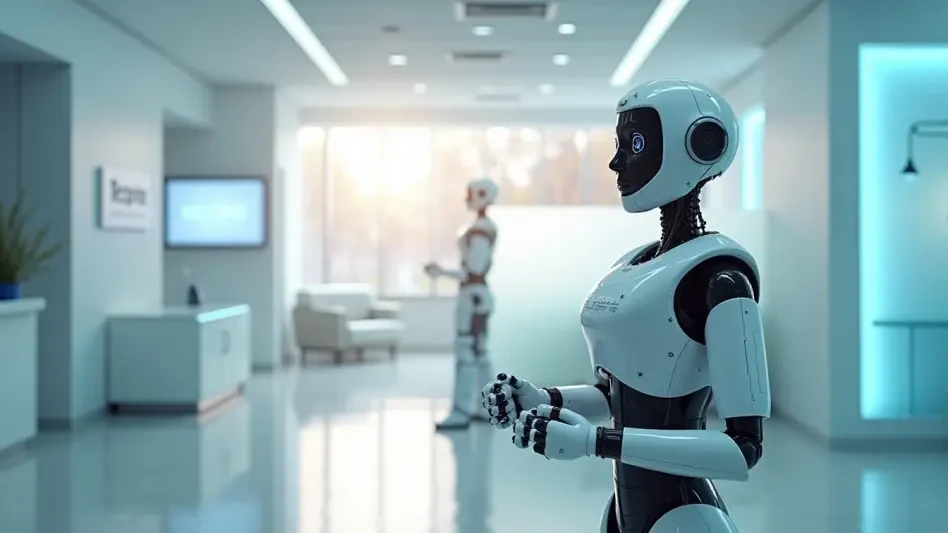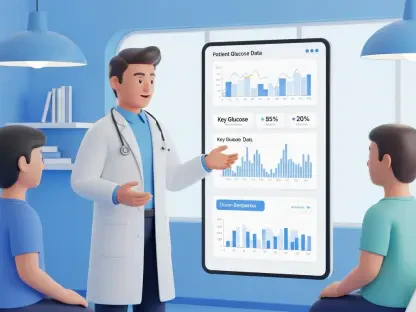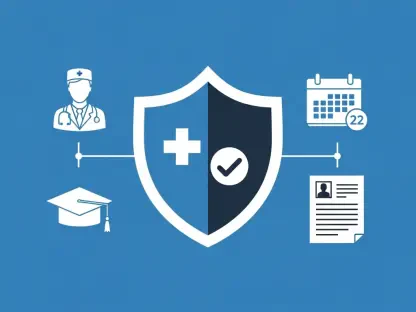In contemporary healthcare, significant challenges arise from the massive amounts of data produced daily, demanding efficient and effective management solutions. As the healthcare industry grapples with inefficiencies and strains within traditional data handling systems, innovative technological solutions have become indispensable. One promising development in this sphere is the Soliton® – AI Engine, developed by Persivia, which seeks to revolutionize healthcare delivery through advanced AI integration. It promises a shift from reactive to proactive patient care, optimizing clinical efficiency and enhancing patient outcomes. The integration of AI into healthcare systems is not new; however, the full realization of its capabilities has often been marred by slow adoption rates and systemic inefficiencies. As the industry stands at a crossroads, the successful deployment of AI tools like Soliton® appears crucial for navigating the future landscape of healthcare services.
Challenges in Healthcare Data Management
The growing complexity and volume of healthcare data present formidable obstacles to traditional systems, impeding effective clinical decision-making. These challenges manifest prominently in inefficient data management and delayed integration of AI into clinical workflows, significantly hindering the seamless utilization of valuable health information. Despite the long-standing presence of AI technologies in the healthcare sector, substantial barriers remain that prevent their full potential from being realized. Health institutions often find themselves overwhelmed by the sheer volume of data from various sources, including patient records, laboratory results, imaging data, and more. Traditional systems, designed without the anticipation of handling such large datasets, struggle to process, analyze, and utilize this information efficiently. The gap between the theoretical capabilities of AI and its practical application in real-world settings points to a pressing need for transformative solutions that can bridge these divides and facilitate a more integrated approach to data-driven healthcare.
The healthcare industry faces the daunting task of integrating AI into a structured system that can keep pace with evolving clinical needs while maintaining data integrity and confidentiality. Many institutions encounter difficulties in aligning new AI technologies with existing systems, often resulting in workflow disruptions or limited utility of the AI capabilities. Furthermore, the utilization of retrospective data analysis has often constrained the role of AI to providing insights after clinical events, rather than equipping practitioners with real-time tools necessary for timely decision-making. These systemic shortcomings underscore the necessity for an AI solution that not only integrates smoothly into current healthcare infrastructures but also enhances real-time clinical decision-making and operational efficiency. As the healthcare industry continues to evolve, adopting an optimized, proactive approach through tools like Soliton® presents a viable path forward.
Uniqueness of Soliton® – AI Engine
Soliton® – AI Engine distinguishes itself by offering seamless integration into existing healthcare systems, thereby enhancing decision-making processes without disrupting established workflows. Unlike conventional AI models, which often deliver insights post-event and result in workflow interruptions, Soliton® provides real-time decision support that is embedded directly into healthcare operations. Designed specifically for healthcare settings, Soliton® is capable of analyzing extensive data sources, incorporating clinical, claims, and social determinants of health (SDOH) information to deliver comprehensive and timely insights. The AI system’s capacity to analyze multiple data streams concurrently and provide actionable insights at the point of care exemplifies its transformative impact. This approach allows healthcare providers to shift focus from reactive responses to a more proactive engagement, anticipating patient needs and curbing potential risks before they manifest. The Soliton® – AI Engine stands as a paradigm shift in harnessing the power of AI to create more efficient, effective, and patient-centric healthcare delivery systems.
Incorporating Soliton® into healthcare infrastructures involves a strategic utilization of its advanced capabilities to refine clinical processes and enhance patient care. The platform is designed to seamlessly blend with existing electronic health records and care management platforms, ensuring continuity and synchronization of data across systems. This integration facilitates a more precise and dynamic risk assessment and patient segmentation, crucial for tailoring healthcare interventions to individual patient needs. Moreover, Soliton®’s design minimizes interruptions, encouraging streamlined workflows where AI recommendations coalesce smoothly with routine clinical practice. By fostering a supportive environment for AI integration, Soliton® empowers healthcare teams to leverage data more effectively, driving improvements in patient outcomes and operational efficiencies within the healthcare system.
Predictive and Prescriptive AI Capabilities
The Predictive AI component of the Soliton® – AI Engine furnishes healthcare providers with the tools to anticipate patient risks and forecast high-cost cases with notable precision. By identifying potential health risks before they become critical, the platform enables practitioners to take preemptive measures, thereby enhancing patient safety and reducing unnecessary hospital admissions. Soliton®’s predictive capabilities extend beyond mere risk identification; they offer healthcare teams the foresight to manage patient care proactively, thereby fostering a culture of preventative healthcare. Such capabilities are pivotal in navigating cost-intensive scenarios, allowing providers to tailor interventions that mitigate risks while optimizing resource allocation.
The Prescriptive AI aspect further augments Soliton®’s value by transforming data insights into actionable healthcare interventions. By bridging the gap between analysis and practice, the AI engine provides guidelines for treatment adjustments and the optimization of personalized care pathways. Soliton® empowers healthcare professionals to make informed decisions that not only enhance individual patient care but also elevate overall treatment efficacy. The prescriptive intelligence embedded within the platform ensures that healthcare teams are equipped with data-driven recommendations for medication management, patient monitoring, and follow-up care. This comprehensive approach facilitates a higher level of personalization in healthcare delivery, addressing the nuances of each patient’s condition, thus improving clinical outcomes and patient satisfaction.
Generative AI and Administrative Efficiency
Leadership in generative AI within the Soliton® platform addresses substantial administrative burdens that often detract from direct patient care. By automating documentation processes, the system alleviates the labor-intensive task of record-keeping, enhancing the overall productivity of healthcare professionals. Soliton® generates clinical notes based on patient interactions, streamlining the completion of documentation and allowing medical staff to dedicate more time to patient engagement and care delivery. This automation significantly reduces clerical workload, promoting operational efficiency by allowing healthcare workers to prioritize direct patient care activities over time-consuming paperwork.
Enhancing administrative efficiency not only improves healthcare delivery but also fosters a conducive environment for quality patient care. Soliton® extends its generative capabilities to automate patient follow-up processes, generating timely and personalized communication. This function enhances patient engagement through automated reminders and follow-ups, keeping patients informed and involved in their care continuum. By facilitating continuous patient interaction, Soliton® supports improved adherence to care plans, thereby contributing to better health outcomes. The platform’s ability to seamlessly integrate these administrative tasks into existing healthcare practices ensures that any adjustments do not detract from the quality of care but rather amplifies it, proving integral in managing organizational workflows.
Financial Impact and Workflow Integration
The financial benefits derived from implementing Soliton® – AI Engine extend beyond clinical improvements, significantly influencing cost efficiency within healthcare environments. By precisely identifying high-risk and high-cost patients, the platform enables healthcare providers to devise strategic interventions that reduce unnecessary hospital admissions and optimize the use of healthcare resources. Soliton®’s accurate risk predictions contribute to improved financial outcomes for healthcare organizations, minimizing expenses associated with preventable complications and hospital stays. This enhances the Risk Adjustment Factor (RAF) scores and Hierarchical Condition Category (HCC) capture, leading to cost savings per member per month for accountable care organizations (ACOs), thereby strengthening the financial health of these institutions.
Integration of Soliton® into existing workflows is characterized by its compatibility with Electronic Health Records (EHRs) and other healthcare management platforms, ensuring real-time data synchronization and coordination across systems. This seamless integration allows for continuous data flow and real-time analysis, providing healthcare providers with timely information critical to decision-making. By eliminating data silos and harmonizing patient information, Soliton® enhances the precision of financial predictions and effectively manages care strategies. This holistic approach ensures that the financial benefits translate into improved patient care and operational efficiency, showcasing the platform’s comprehensive impact on modernizing healthcare delivery in a resource-efficient manner.
The Rising Trend of AI in Healthcare
The transformation driven by AI technologies in healthcare aligns with an industry-wide shift towards solutions that deliver tangible operational benefits and improved patient outcomes. Soliton® – AI Engine exemplifies this trend by providing a sophisticated AI platform that empowers healthcare teams with essential tools for delivering expedited, informed, and effective patient care. The platform not only addresses current healthcare challenges but sets a precedent for how advanced AI solutions can reshape future healthcare landscapes by integrating seamlessly into both clinical and administrative practices.
As healthcare organizations increasingly consider AI-driven technologies, Soliton® represents a model for embracing innovative solutions that prioritize efficiency and patient-centric services. The AI engine’s ability to deliver functional improvements across various aspects of healthcare delivery positions it as an influential tool in reimagining how patient care can be managed. Moving forward, the integration of such technology in healthcare systems is expected to result in continued advances in clinical accuracy, cost management, and patient satisfaction, driving the evolution of healthcare toward smarter, more responsive care models. By leveraging AI effectively, healthcare institutions can ensure that their services remain cutting-edge and resilient in the face of evolving patient needs and technological advancements.









